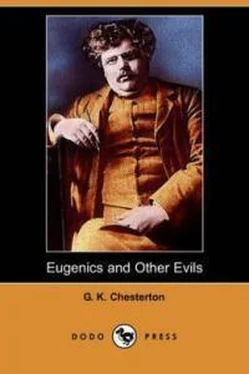This is the first evidence of motive: the ubiquitous assumption that life and love must fit into a fixed framework of employment, even (as in this case) of bad employment. The second evidence is the tacit and total neglect of the scientific question in all the departments in which it is not an employment question; as, for instance, the marriages of the princely, patrician, or merely plutocratic houses. I do not mean, of course, that no scientific men have rigidly tackled these, though I do not recall any cases. But I am not talking of the merits of individual men of science, but of the push and power behind this movement, the thing that is able to make it fashionable and politically important. I say, if this power were an interest in truth, or even in humanity, the first field in which to study would be in the weddings of the wealthy. Not only would the records be more lucid, and the examples more in evidence, but the cases would be more interesting and more decisive. For the grand marriages have presented both extremes of the problem of pedigree—first the "breeding in and in," and later the most incongruous cosmopolitan blends. It would really be interesting to note which worked the best, or what point of compromise was safest. For the poor (about whom the newspaper Eugenists are always talking) cannot offer any test cases so complete. Waiters never had to marry waitresses, as princes had to marry princesses. And (for the other extreme) housemaids seldom marry Red Indians. It may be because there are none to marry. But to the millionaires the continents are flying railway stations, and the most remote races can be rapidly linked together. A marriage in London or Paris may chain Ravenna to Chicago, or Ben Cruachan to Bagdad. Many European aristocrats marry Americans, notoriously the most mixed stock in the world; so that the disinterested Eugenist, with a little trouble, might reveal rich stores of negro or Asiatic blood to his delighted employer. Instead of which he dulls our ears and distresses our refinement by tedious denunciations of the monochrome marriages of the poor.
For there is something really pathetic about the Eugenist's neglect of the aristocrat and his family affairs. People still talk about the pride of pedigree; but it strikes me as the one point on which the aristocrats are almost morbidly modest. We should be learned Eugenists if we were allowed to know half as much of their heredity as we are of their hairdressing. We see the modern aristocrat in the most human poses in the illustrated papers, playing with his dog or parrot—nay, we see him playing with his child, or with his grandchild. But there is something heartrending in his refusal to play with his grandfather. There is often something vague and even fantastic about the antecedents of our most established families, which would afford the Eugenist admirable scope not only for investigation but for experiment. Certainly, if he could obtain the necessary powers, the Eugenist might bring off some startling effects with the mixed materials of the governing class. Suppose, to take wild and hypothetical examples, he were to marry a Scotch earl, say, to the daughter of a Jewish banker, or an English duke to an American parvenu of semi–Jewish extraction? What would happen? We have here an unexplored field.
It remains unexplored not merely through snobbery and cowardice, but because the Eugenist (at least the influential Eugenist) half–consciously knows it is no part of his job; what he is really wanted for is to get the grip of the governing classes on to the unmanageable output of poor people. It would not matter in the least if all Lord Cowdray's descendants grew up too weak to hold a tool or turn a wheel. It would matter very much, especially to Lord Cowdray, if all his employees grew up like that. The oligarch can be unemployable, because he will not be employed. Thus the practical and popular exponent of Eugenics has his face always turned towards the slums, and instinctively thinks in terms of them. If he talks of segregating some incurably vicious type of the sexual sort, he is thinking of a ruffian who assaults girls in lanes. He is not thinking of a millionaire like White, the victim of Thaw. If he speaks of the hopelessness of feeble–mindedness, he is thinking of some stunted creature gaping at hopeless lessons in a poor school. He is not thinking of a millionaire like Thaw, the slayer of White. And this not because he is such a brute as to like people like White or Thaw any more than we do, but because he knows that his problem is the degeneration of the useful classes; because he knows that White would never have been a millionaire if all his workers had spent themselves on women as White did, that Thaw would never have been a millionaire if all his servants had been Thaws. The ornaments may be allowed to decay, but the machinery must be mended. That is the second proof of the plutocratic impulse behind all Eugenics: that no one thinks of applying it to the prominent classes. No one thinks of applying it where it could most easily be applied.
A third proof is the strange new disposition to regard the poor as a race ; as if they were a colony of Japs or Chinese coolies. It can be most clearly seen by comparing it with the old, more individual, charitable, and (as the Eugenists might say) sentimental view of poverty. In Goldsmith or Dickens or Hood there is a basic idea that the particular poor person ought not to be so poor: it is some accident or some wrong. Oliver Twist or Tiny Tim are fairy princes waiting for their fairy godmother. They are held as slaves, but rather as the hero and heroine of a Spanish or Italian romance were held as slaves by the Moors. The modern poor are getting to be regarded as slaves in the separate and sweeping sense of the negroes in the plantations. The bondage of the white hero to the black master was regarded as abnormal; the bondage of the black to the white master as normal. The Eugenist, for all I know, would regard the mere existence of Tiny Tim as a sufficient reason for massacring the whole family of Cratchit; but, as a matter of fact, we have here a very good instance of how much more practically true to life is sentiment than cynicism. The poor are not a race or even a type. It is senseless to talk about breeding them; for they are not a breed. They are, in cold fact, what Dickens describes: "a dustbin of individual accidents," of damaged dignity, and often of damaged gentility. The class very largely consists of perfectly promising children, lost like Oliver Twist, or crippled like Tiny Tim. It contains very valuable things, like most dustbins. But the Eugenist delusion of the barbaric breed in the abyss affects even those more gracious philanthropists who almost certainly do want to assist the destitute and not merely to exploit them. It seems to affect not only their minds, but their very eyesight. Thus, for instance, Mrs. Alec Tweedie almost scornfully asks, "When we go through the slums, do we see beautiful children?" The answer is, "Yes, very often indeed." I have seen children in the slums quite pretty enough to be Little Nell or the outcast whom Hood called "young and so fair." Nor has the beauty anything necessarily to do with health; there are beautiful healthy children, beautiful dying children, ugly dying children, ugly uproarious children in Petticoat Lane or Park Lane. There are people of every physical and mental type, of every sort of health and breeding, in a single back street. They have nothing in common but the wrong we do them.
The important point is, however, that there is more fact and realism in the wildest and most elegant old fictions about disinherited dukes and long–lost daughters than there is in this Eugenist attempt to make the poor all of a piece—a sort of black fungoid growth that is ceaselessly increasing in a chasm. There is a cheap sneer at poor landladies: that they always say they have seen better days. Nine times out of ten they say it because it is true. What can be said of the great mass of Englishmen, by anyone who knows any history, except that they have seen better days? And the landlady's claim is not snobbish, but rather spirited; it is her testimony to the truth in the old tales of which I spoke: that she ought not to be so poor or so servile in status; that a normal person ought to have more property and more power in the State than that . Such dreams of lost dignity are perhaps the only things that stand between us and the cattle–breeding paradise now promised. Nor are such dreams by any means impotent. I remember Mr. T.P. O'Connor wrote an interesting article about Madame Humbert, in the course of which he said that Irish peasants, and probably most peasants, tended to have a half–fictitious family legend about an estate to which they were entitled. This was written in the time when Irish peasants were landless in their land; and the delusion doubtless seemed all the more entertaining to the landlords who ruled them and the money–lenders who ruled the landlords. But the dream has conquered the realities. The phantom farms have materialised. Merely by tenaciously affirming the kind of pride that comes after a fall, by remembering the old civilisation and refusing the new, by recurring to an old claim that seemed to most Englishmen like the lie of a broken–down lodging–house keeper at Margate—by all this the Irish have got what they want, in solid mud and turf. That imaginary estate has conquered the Three Estates of the Realm.
Читать дальше








